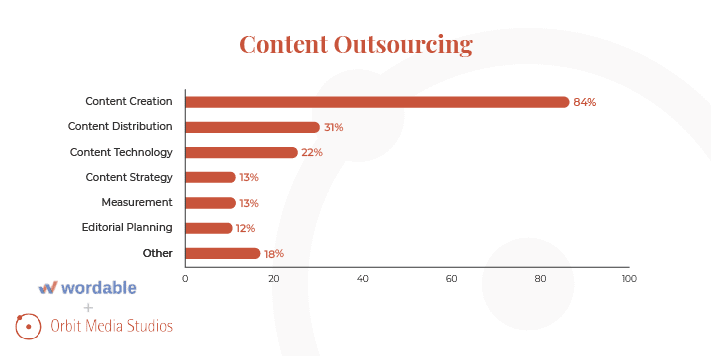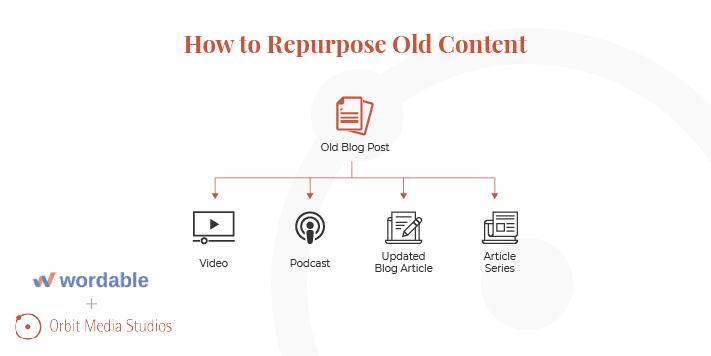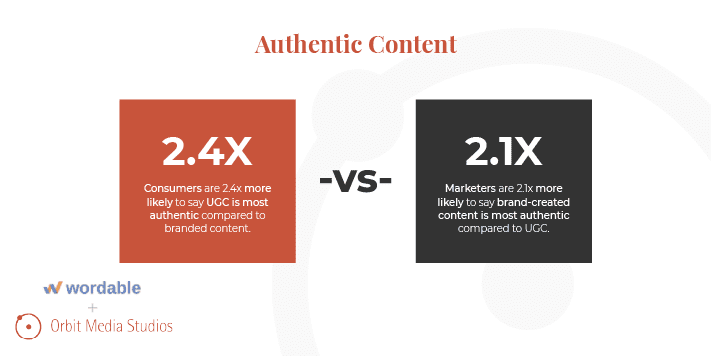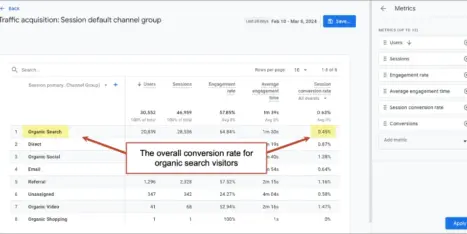Obviously, your company wants to grow. The entire purpose of any business is to get larger and generate more profit.
One of the best ways to do that is through content marketing. You’ve heard that content is vital to success, and that’s why having a content marketing strategy is important for businesses in 2020.
As your company scales, your content marketing is going to as well. It’s vital that you maintain content quality while increasing production. Unfortunately, in this competitive and fast-paced environment, shortcuts become all too common for B2C and B2B marketers alike.
But that can’t be allowed to happen. Not only will your audience notice the huge dip in quality, but Google takes the quality of your content into account when assigning an SEO score to your pages.
So, how can you, as a marketer, scale up marketing efforts while still producing quality content? Here’s a list of several strategies you can start employing today.
Understand Your Audience
All of your content needs to be specifically targeted. No, we’re not talking about the targeting involved with Google Ads or Facebook advertising (more on that later). Rather, when composing content, everything has to be done with your core audience in mind, as if you’re creating personalized content for them.
When starting to scale your content, your buyer personas have to be taken into account and kept in mind throughout. A buyer persona represents the ideal customer for your business. Larger businesses might have various buyer personas to embody the different segments of their target market.

When it comes time to create more content, new and exciting ideas are going to be thrown around.
“Let’s do videos!”
“Let’s make a podcast!”
“We should send out an email newsletter!”
All of these are valid ideas, but you have to ask yourself a few questions before you start creating that content.
- Does this tactic appeal to a segment of my target market?
- How popular is this form of content with those I’ve chosen to target?
- Which buyer personas perfectly match up with the content we’re going to create?
If you’re a company that serves a broad demographic, you should be creating segmented marketing campaigns that appeal to various different buyer personas.
As time goes on and your company continues to grow, it’s important to re-evaluate your audience and adjust your content around the results you get. You have to age and evolve with your target market.
Failure to do so would mean that your audience outgrows your company and moves on.
A number of factors that can impact your relevance in the eyes of your target audience include:
- Their age
- Their profession
- Their recreational interests
- Available technology and their relationship to it
- And much more!
Assemble a Writing Dream Team
When Nick Fury assembled The Avengers for the Marvel Cinematic Universe, he was looking for the best of the best. A group of skilled heroes that would come together on a day unlike any other to fight the battles that humanity could not handle on its own.
While the stakes are substantially lower in the world of content marketing, the basic premise is the same. You have to assemble a marketing team of skilled writers who can bring your content strategy to life.
This writing dream team should be composed of skilled and experienced professionals who can adapt to the specific voice and style of your company in a way that feels natural and appropriate for your audience.
 |
Mark Sandusky, ManlyWellness“Assembling a writing team has been our biggest opportunity to scale content effectively. Doing so allows us to produce content at a faster rate, getting our guides in front of readers in just days, rather than months. To maintain quality at scale, we don’t just hire any content writer. We make it a collaborative effort within our team. Take our BetterHelp review for example. It’s written as a combined effort between our medical writers and real, certified health professionals to master tone, style, and medical accuracy.“ |
Quality content takes quality writers. It’s a simple concept, but this is one of the most important aspects of scalable content marketing.
Whether in-house or outsourced, a good writing team is powerful for organic growth.
Of course, you’re going to have to take great care in how you put this team together.
Some desirable traits that you should be looking for include:
- Content marketing experience
- SEO experience
- Knowledge of your industry and subject matter
- The ability to string a narrative together
Once you have all of that in mind, the question becomes, should you hire in house writers or outsource to a writing agency? The answer to that question is entirely dependent on your preferences, but 84% of B2B businesses choose to outsource their content creation — and for good reason.

When you outsource, you have an entire team of writers to create content, as opposed to relying on just one or two in house employees who could become overwhelmed as your content production scales up.
You’re also able to scale without sacrificing quality, as long as you’ve found a firm that will conform to the unique voice and style of your organization.
Instead of a writing team, consider having one full-time Content Editor on staff. This person can communicate with the outsourced firm and ensure that the content being produced is in line with your branding and content marketing goals.
 |
Travis Jamison, Smash Digital“Hiring the right people for the right positions is one of the best investments you can make. One of the most common mistakes business owners make when it comes to content marketing, is hiring good writers. Most good writers are unlikely to have any significant expertise in your industry. This means that you’re going to end up with mediocre content or a lengthy and inefficient editorial process. Instead, you want to look for experts in your industry or writers who are passionate about the topic and then work with an editor to finalize the content. Start looking for active members to reach out to at the most popular communities, subreddits, and Facebook groups in your field. You’ll be blown away by the quality of talent and the terms you’ll be able to negotiate.“ |
Educate Your Writers
Speaking of content writing goals, you can’t expect an outsourced content production agency to know the ins and outs of your company’s style and the nuances of your content marketing strategy.
These things have to be communicated effectively to your writers if they have any hope of meeting your expectations.
The bottom line is that writers are not mind readers. They don’t have some special ability to absorb your brand persona data and content marketing strategy.
You have to educate your writers and let them know exactly what you want.
Of course, as a business owner, you’re busy and don’t have time to go through the minutiae of your strategy every time you bring on a new writer. That’s why you should have various resources available that will help writers adapt to your style as you continue to scale upward.
A new writer can hit the ground running if they have a content style guide that explains your target market, brand voice, specific grammatical style, image guidelines, and more.
Obviously, you’re going to have more than one writer creating content for you as your company scales. But the content has to be uniform across the board and feel as though it all came from the same mind.
That includes everything from social media posts to website copy, ad copy, podcasts, videos, and any other piece of branded content that comes out of your organization.
As the company scales, you’re going to need to bring on more writers. The learning curve for those writers will be substantially less if you provide them with the proper educational materials.
Many companies provide a style guide as a text document. However, humans tend to retain information better through visual content. Consider creating a series of training videos for your writers that will help them absorb what you’re trying to teach them in a more efficient way.
Provide Useful Tools, Like Wordable, Grammarly, and Market Muse
Another way that you can help a content creator maintain quality while your company scales is to provide them with tools that will make the writing process easier.
This will help them create more content while maintaining the high quality that both you and your audience have come to expect from your brand.
But what kind of tools will be the most effective for your writers?
There are a few that we’ve found to be very useful.

For starters, consider Wordable. This tool allows writers to create content using Google Docs and then export that copy into WordPress.
Here’s a little peek inside the mind of a writer.
Writers hate writing directly in WordPress.
There’s a lot that can go wrong when creating original content on this platform. You haven’t known true dread until you’ve created a 2,000 word blog post and completely lost it because you forgot to save your draft in WordPress.
So, writers like to create content on outside platforms.
One of the most common is Google Docs.
Google Docs appeals to writers because it automatically saves your work, and it’s easy to share. You can even do collaborative live edits with another user.
The problem is that when you copy and paste text from Google Docs to WordPress, it throws off the formatting. So, you either have to be a coding whiz to fix these issues, or have a tool like Wordable.
Wordable lets you write your content in Google Docs, upload the doc into Wordable, and then export that content directly into WordPress with no formatting issues whatsoever.
Another popular tool that helps writers create great content is Grammarly.
This grammar and spelling checker has become one of the web’s most trusted tools in recent years. Writers can check all of their written content for spelling mistakes, grammar issues, overused words, and even cases of accidental plagiarism with remarkable accuracy.
Then, of course, there’s the issue of optimization. Once you’ve written your content you have to prepare it for Search Engine Optimization, or SEO.
While you could slave away for hours conducting keyword research on a free platform such as Google Keyword Planner, we highly recommend MarketMuse.
This platform allows you to analyze specific search items, generate questions and associated keywords that go along with them, and check out your major competition.
By having writers upload their content into MarketMuse, they will receive a content score that predicts how well the copy will perform for the desired search term.
MarketMuse gives you an average score and a target score, showing you precisely how you can outmaneuver your largest competitors.
Establish a Workflow
It’s important to establish a consistent content marketing program or workflow for your writers and editors.
This ensures that no matter how far the company scales, there are still proven processes in place that will keep the quality of your content consistent.
This process should effectively manage the content production workflow from concept through production, to optimization and promotion.
If you tried to approach content production without the proper workflow in place, you’re going to find that quality dips as you continue to scale.
The first thing you’re going to have to do is establish a framework for content creation by answering a series of questions.
- How do you generate ideas for new topics? What research goes into selecting relevant and high volume content topics?
- How are these projects assigned? Are you using a workflow system to track assignments and deadlines?
- How should the writer prepare? Do you require an outline before drafting?
- Once the draft is complete, what is the writer’s role in the editing and optimization of the piece?
- Once the writer hands content off, who does it go to? What has to be done in order to prep the content for release?
- How do you publish content? Is there a set content schedule or content calendar?
Once you have all of this laid out, your content production efforts will run like a well oiled machine. No matter how high your company scales, this content marketing process will keep production on course, ensuring quality along the way.
Repurpose Older Content
It is possible to create new content out of something you’ve already created. Repurposing older content into something completely new is a tactic that can provide you with excellent results while exerting only half the effort.

Check out some of your highest performing blog articles. Is there anything in that article that can be updated? Statistics change year over year, so something that you wrote in 2018 that saw a ton of traffic might be irrelevant in 2020.
Or, maybe even branching out to new languages?
 |
TOM COX, CONTENT MARKETER, PREPLY“As we grow and expand into new languages, we are onboarding more writers for the Preply blog and other areas of the product, who work in cross-functional teams, but still function as a “writing committee.” Before content goes live, two team members are asked to give timely, objective feedback on a piece of writing—whether it’s a how-to article, a confirmation email, or a notification in the Preply app. This enables writers who are working on different sides of the product to provide fresh insights and add value to each piece of content.“ |
Thankfully, it’s a pretty simple matter to go through this aged content and update some statistics, add fresh images, and make it relevant once more for a modern audience.
Once that’s done, you can push it out along your various promotional channels.
But that’s not the only way you can repurpose content. Written articles can easily be updated into a whole new content type.
 |
Shanelle Weir, Digital Project Manager, Freshbooks“At Freshbooks, one of our main priorities is driving value as we scale content. Currently, we are heavily focused on using content upgrades, or lead magnets like invoice templates, to both drive value to readers and keep them coming back for more. We can then repurpose these into longer tutorials for our knowledge base, blog content, and more, providing us content that scales effortlessly.“ |
Consider taking a high performing blog post and making a podcast episode out of it.
Better yet, repurpose that content into a video and push it out on YouTube.
If you have list articles, you can take each individual list item and create a short blog post about it, diving more in depth than you would be able to in the original. Make sure you’re linking to that new post from the original list, and link back to the original post from the smaller satellite article.
This creates a hub and spoke article series, and it does wonders for content repurposing and SEO.
Increase Authenticity With User-Generated Content
If you want to save on both time and money while giving yourself a much needed boost in authenticity and public relations, consider user-generated content.
Influencer marketing is a growing trend in today’s business world, and you can leverage the popularity and trust that consumers have in their peers by featuring content specifically developed by users.
If you find a particularly glowing and well-written review of your company online, consider using it in your marketing efforts.
Corporate messaging is always received with a large grain of salt by the prospects you’re trying to reach, so providing content created by actual users with real pain points can go a long way toward establishing authenticity.

Studies have shown that authenticity is valued by more than 90% of consumers. Users are 2.4 times more likely to find authenticity in user-generated content as opposed to branded messaging.
While user-generated content is not likely to be as well-written as something that came from a professional content marketing writer, it comes with quality of a different kind.
Authenticity is quality in the minds of your users, and utilizing this content is a great way to inject authentic quality into your content marketing without having to expend more effort.
Ramp Up Content Promotion
When you’re creating more content for a scaling company, you can’t skimp on the promotion of said content.
That means you have to push your content out on targeted platforms like Google Ads or Facebook advertising. These marketing ventures allow you to specifically target your buyer personas, based on factors like:
- Age
- Profession
- Geographic location
- Interests
- Search history
- Income
- And more
You should also be shopping content around to other high traffic relevant websites in your industry. Create quality content that these sites would want to see featured for their readers, and make sure that somewhere in that article, you’re including a link back to your own site.
 |
Matthew Laurin, President of Esq. Marketing“Once you’ve developed high-quality content, the next biggest impact on success is getting links to said content. Whether it’s a full on guest post or just a mention, links help you scale the growth of that piece, maximizing its downstream traffic, sales, and revenue.“ |
This not only creates a path for readers to discover more of your content, but it creates backlinks, which are essential for SEO success.
This can be an exhausting and time consuming process, so consider using an outside service like uSERP to build links by creating and shopping these articles around for you.
Conclusion
When scaling your content marketing efforts upward, it’s important that you, as a skilled content marketer, remember to keep the quality of your creation in mind.
By utilizing these tips, you will be able to scale content marketing and maintain the quality that your audience has come to expect from you.
The content that you create using these tips and tricks will carry you to the next level of business success.




